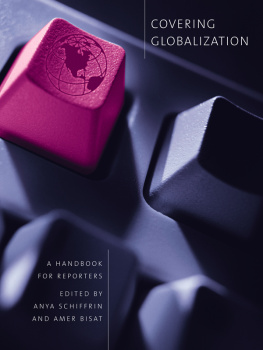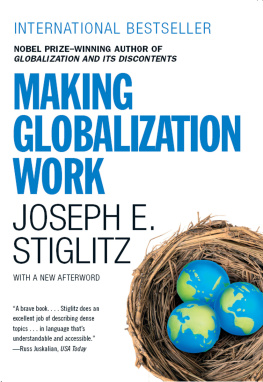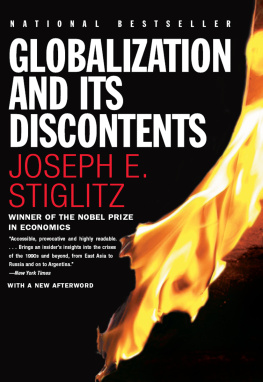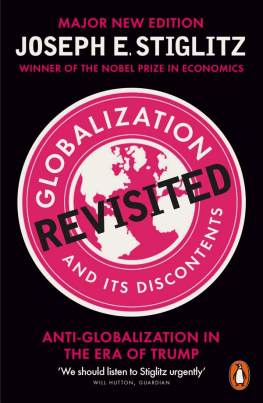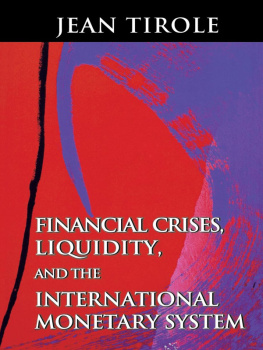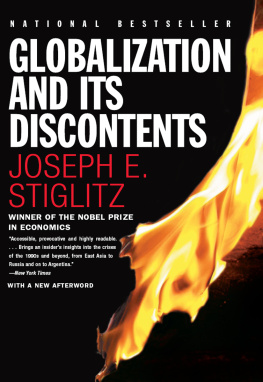COVERING
GLOBALIZATION
COVERING GLOBALIZATION
A HANDBOOK FOR REPORTERS
EDITED BY ANYA SCHIFFRIN AND AMER BISAT
COLUMBIA UNIVERSITY PRESS
NEW YORK
COLUMBIA UNIVERSITY PRESS
Publishers Since 1893
New York Chichester, West Sussex
cup.columbia.edu
Copyright 2004 Columbia University Press
All rights reserved
E-ISBN 978-0-231-50640-3
Library of Congress Cataloging-in-Publication Data
Covering globalization : a handbook for reporters / edited by Anya Schiffrin and Amer Bisat.
p. cm.
Includes bibliographical references and index.
ISBN 0231131747 (cloth : alk. paper)0231131755 (pbk. : alk. paper)
1. International finance. 2. Globalization. 3. International economic relations.
I. Schiffrin, Anya, 1962II. Bisat, Amer.
HG3881.C67437 2004
A Columbia University Press E-book.
CUP would be pleased to hear about your reading experience with this e-book at .
For Joe and for Nadia
CONTENTS
DOZENS OF PEOPLE contributed to this book in many different ways. The idea of the book grew out of a Web site that a number of people have written for and supported. Nicholas Rosen, Trond Gabrielsen, and Sara Silver were the first writers on the site; Alejandro Bianchi and Peter Green came on soon after. Alex Fishman did the first postings. Deidre Sheehan did a fantastic job of editing the texts on the Web site and so helped improve the pieces that are in this book. Jane Folpe did a typically thorough job of research, and I am very grateful to Susan Schneider for her editing and Dao Thu Hien for the job she did on researching the book. Shari Spiegel, Anton Korinek, Kim Andreassen, and Shana Hofstetter all worked on various aspects of administering and designing the Web site. The Open Society Institute and the Ford Foundation funded the project, so special thanks are due to Butch Montes, Laura Silber, and George Soros. Chrystia Freeland, Mark Clifford, Abid Aslam, Darren McDermott, Roman Frydman, Grainne McCarthy, Anne Nelson, Sheridan Prasso, Tim Carrington, and Graham Watts were among the first people to understand my idea and encourage me to pursue it. Frydman helped with marketing the site, as did Tim Karr. The site itself came out of conversations with reporters in countries as diverse as Argentina, Bolivia, Ecuador, Bulgaria, Moldova, Uruguay, and Vietnam. A number of people in those countries (and others) gave me help and ideas including My Ha Nguyen, Fang Wang, Mary Campbell, Monica Almeida, Petko Shishkov, and Tanja Jakobi.
Terri Thompson is the director of the Knight-Bagehot Fellowship at Columbia Universitys Graduate School of Journalism, where I learned an enormous amount about what makes a successful business/economics journalism program and a great deal from the experience of fellow journalists such as John Authers and Kim Allers. Much of what I know formally about economics and finance came from studying with Mary Ellen Carter, Graciana del Castillo, Ann Harrison, Hugh Patrick, and Matt Rhodes Kropf at Columbia University. My editors at Dow Jones Newswires and at the Asian Wall Street Journal gave me the chance to write about economics and business: John Hitchcock gave me my first full-time job as a business reporter and sent me to Amsterdam and Hanoi for five years. Once I got there, Michael Bergmeijer, George Thomas, Rod Alvarez, Kambiz Foroobhar, Roger Malone, Rob Fischer, David Plott, Aki Sato, and Reginald Chua urged me on. Samantha Marshall and Jesse Pesta taught me an enormous amount about good business writing. At the Industry Standard, Jane Goldman, Jim Ledbetter, Thomas Goetz, Rich Turner, and Jonathan Weber were wonderful bosses; Megan Barnett, Matt Yeomans, Hugh Garvey, Greg Dalton, Bill Brazell, and Susan Orenstein were terrific colleagues; and Kevin Kelleher was a tireless editor and a dream to work for. My partner, Joseph E. Stiglitz, read many of the drafts and contributed his comments. Ravi Kanbur and Michael Orszag also shared their ideas and suggestions, and Frederic Mishkins writing informed much of my work. While I was overseas, I learned a lot from my sources: Raymond Salet at the Netherlands Ministry of Finance, Andrew Steer and Nisha Agrawal at the World Bank office in Hanoi, Tony Foster at Freshfields, Elizabeth Dahlin at the Embassy of Sweden, and countless Vietnamese sources who asked for anonymity. My Hanoi colleagues, Adrian Edwards, Jonathan Birchall, Kevin Bubel, Tim Larimer, Kristin Huckshorn, and Dean Yates were endlessly supportive and creative, as were Paul Alexander, Ian Stewart, Dao Thu Hien, Bo Hong Mai, Ho Binh Minh and Nguyen Trinh Thi, Nguyen Pham Muoi, Mila Rosenthal, Huynh Quoc, and Nguyen Hung.
At Columbia University, Robert Garris, Lisa Anderson, David Klatell, Robin Lewis, Nick Lemann, Arlene Morgan, and Michelle Steer have been enormously helpful. Id like to thank my editor, John Michel, as well as his Columbia University Press colleagues Jeanie Lu and Michael Haskell and Claire Wellnitz for all their efforts.
G LOBALIZATION HAS BECOME a major subject of interest in both developing and developed countries. Reporters are now I being asked not only to cover major events, such as the annual I meetings of the International Monetary Fund and the World Bank and the periodic meetings of the World Trade Organization, but also to interpret what happens at those meetings within the broader debate on globalization. Indeed, media coverage already has played an important role in shaping the recent evolution of globalization. The media spotlight, including reporting trade agreements after the riots in Seattle at what was supposed to be the inauguration of a new round of trade negotiations in December 1999, helped validate many of the criticisms that had been leveled by the critics of globalization and provided some of the impetus for having the new round of trade negotiations focus on development.
While economic and business reporters naturally focus on economic globalizationthe closer integration of the economies of the world as a result of the reduction of transportation and communication costs and the reduction of manmade barriers to the movements of goods, services, and capital throughout the worldthere are other important dimensions to globalization: the spread of knowledge, ideas, ideology, civil society, and culture. These dimensions represent both some of the greatest virtues and some of the most important criticisms of globalization. Advocates of globalization see not only the increases in incomes but also the spread of democratic values. Opponents of globalization worry not just about the loss of jobs but about the loss of local culture.
Supporters of globalization point out that it enables each country to learn from the lessons of others. Critics point out that it has resulted in international economic institutions imposing the same policies around the world, regardless of their appropriateness to the situation at hand. They worry that global institutions do not have the detailed local knowledge required to tailor closely economic policies to individual countries. For example, responses to economic crises are often similar, whether these crises arise in Latin Americawhere there has been a history of large budget deficits and loose monetary policy (resulting in high inflation)or in East Asiawhere governments have been running surpluses and inflation has not been a problemand whether or not the countries affected have a high level of private indebtedness. In all of these cases, countries having economic problems have been told to cut deficit spending and raise interest rates. Much of this advice is meant to bring these nations in line with global economic policies, such as trade liberalization or privatization, which can lead to foreign ownership of local companies.

